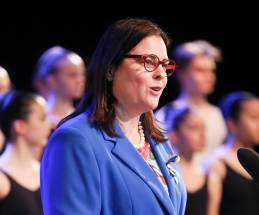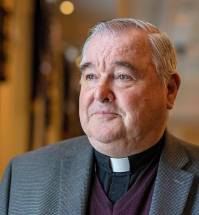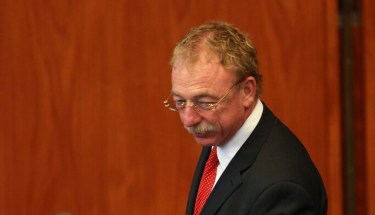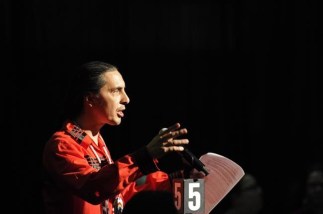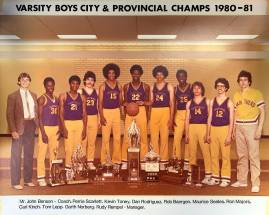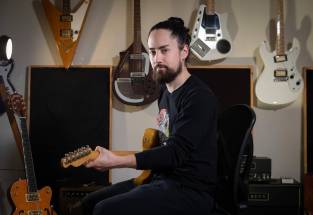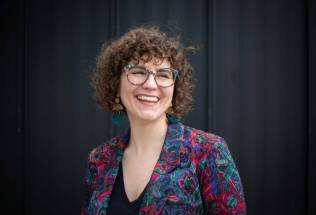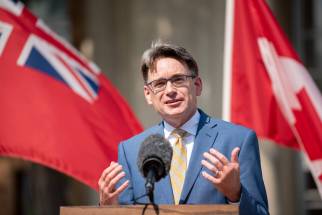Indigenous delegations’ meetings with Pope expected to drive reconciliation
Read this article for free:
or
Already have an account? Log in here »
To continue reading, please subscribe:
Monthly Digital Subscription
$0 for the first 4 weeks*
- Enjoy unlimited reading on winnipegfreepress.com
- Read the E-Edition, our digital replica newspaper
- Access News Break, our award-winning app
- Play interactive puzzles
*No charge for 4 weeks then price increases to the regular rate of $19.00 plus GST every four weeks. Offer available to new and qualified returning subscribers only. Cancel any time.
Monthly Digital Subscription
$4.75/week*
- Enjoy unlimited reading on winnipegfreepress.com
- Read the E-Edition, our digital replica newspaper
- Access News Break, our award-winning app
- Play interactive puzzles
*Billed as $19 plus GST every four weeks. Cancel any time.
To continue reading, please subscribe:
Add Free Press access to your Brandon Sun subscription for only an additional
$1 for the first 4 weeks*
*Your next subscription payment will increase by $1.00 and you will be charged $16.99 plus GST for four weeks. After four weeks, your payment will increase to $23.99 plus GST every four weeks.
Read unlimited articles for free today:
or
Already have an account? Log in here »
Hey there, time traveller!
This article was published 25/03/2022 (1355 days ago), so information in it may no longer be current.
A journey that started four years ago — interrupted twice by the COVID-19 pandemic — takes an important step next week when delegations from the Assembly of First Nations, Métis National Council the Inuit Tapiriit Kanatami meet Pope Francis in Rome.
The meetings, which will take place at the Vatican, run March 28 to April 1.
Each delegation will get an hour with the Pope, with a final combined audience with him at the end of the week.
While there, the delegations intend to ask for the Pope to come to Canada to apologize to Indigenous people on the church’s behalf and, especially, to survivors of Roman Catholic-operated residential schools.
They also want the release of all records on residential schools, along with the return of Indigenous artifacts held by the church.
The AFN delegates will also ask the Pope to revoke the Doctrine of Discovery, a papal bull (or edict) issued in 1493 that gives all new lands discovered by explorers to their home countries.
The Métis delegation is seeking the church to provide reparations to the Métis Nation, including financial support for community-led healing and community rebuilding initiatives.

Winnipeg Archbishop Richard Gagnon, who has been part of the discussions about the visit since 2018, expects the Pope to be a sympathetic listener.
“The Holy Father very much wanted to have these meetings,” Gagnon said, adding he expects him to be open to hearing about the pain and suffering many Indigenous people have experienced.
The archbishop also knows the main thing people want to know is when the Pope will come to Canada. While Gagnon didn’t want to speculate, he indicated it could “be in the near future,” perhaps as early as this summer.
“It won’t be in wintertime,” he added.
Gagnon also doesn’t know what the Pope will say to the delegations. However, he said, people can look to what the Pope said in Bolivia in 2015, when he apologized to Indigenous people in South America, asking forgiveness “for crimes committed against the native peoples during the so-called conquest of America.”
As for what any such final statement will be, or where in Canada the Pope will visit, “that will need further discussion,” the archbishop said.
The most important thing now, he said, is how the visit will advance the church’s goal of reconciliation with Indigenous people.
“St. Paul says all Christians are to be ministers of reconciliation,” Gagnon said, adding the ultimate picture of reconciliation for Catholics is the mass, which shows God’s reconciliation with humanity through Jesus.
“The reality is we have broken relationships with Indigenous people here in Canada,” he said, and that affects how the Catholic Church understands and participates in the role of reconciliation between God and humans.
In order to have true reconciliation with God, Catholics in Canada need to see reconciliation with Indigenous people “as part of the mission of the church.”
For Gagnon, this reconciliation is best pursued at the local parish level, where many such efforts are already occurring.
For that reason, the Indigenous delegations’ visit to the Vatican and meetings with the Pope could be “a motivation and spark to draw attention to this mission of reconciliation for Catholics. It is another step along the way.”
John Longhurst is in Rome this week to cover the papal visit by Indigenous people for the Free Press. See coverage of the visit at winnipegfreepress.com/papalvisit
faith@freepress.mb.ca
The Free Press is committed to covering faith in Manitoba. If you appreciate that coverage, help us do more! Your contribution of $10, $25 or more will allow us to deepen our reporting about faith in the province. Thanks! BECOME A FAITH JOURNALISM SUPPORTER

John Longhurst has been writing for Winnipeg's faith pages since 2003. He also writes for Religion News Service in the U.S., and blogs about the media, marketing and communications at Making the News.
Our newsroom depends on a growing audience of readers to power our journalism. If you are not a paid reader, please consider becoming a subscriber.
Our newsroom depends on its audience of readers to power our journalism. Thank you for your support.
The Free Press acknowledges the financial support it receives from members of the city’s faith community, which makes our coverage of religion possible.

